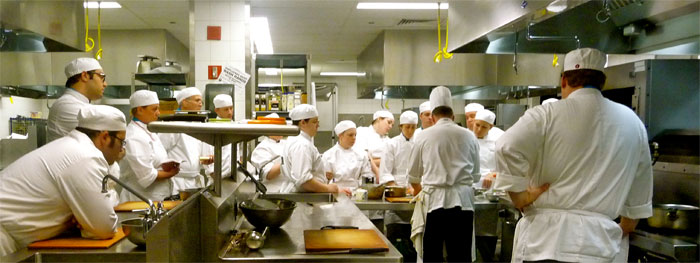What to look for in a Culinary School
Have you decided to pursue a new career?
The opportunities in the culinary field are limitless, but first you'll want to find the school that's the best fit for you. Some things you'll want to consider are class size, location, and tuition costs...
Class Size
It's been proven time and time again that smaller class sizes lead to a more personal, thorough education. The more students in a class, the more a teacher is not able to give you the individual attention you may need. In a field such as culinary arts, where a lot of the education is learned by doing, this is an especially important issue. Will you have your own work station to learn a new cooking technique, or will you have to take your turn? Or worse yet, will you only get to observe? Choosing a school with a smaller class size ensures you will have the best chance to practice and hone your skills. You will feel less threatened to ask questions in a smaller class size, and your teacher will be able to focus more on your individual needs. When researching a culinary school, make sure to ask about the teacher to student ratio. You may need to ask a little more detailed information such as how many work stations are in a class and how much time does a student actually get with hands on training. Larger class sizes may be acceptable for some classes, but for the hands on classes, make sure that the size of the class will not threaten the quality of your education in any way.
Location
You may have your heart set on a school that takes over an hour to get to every day, and that isn’t necessarily a bad thing if the school of your dreams is a great quality school. But you’ll want to ask yourself how far you’re willing to travel to get to school each day, and whether that time can be better utilized by choosing another school that may be closer. Remember that you will be spending a great deal of time at the school you choose, and doing homework when you’re not at school. The last thing you’ll want to worry about in your busy day is factoring in a long commute. And then what happens when you arrive at school? Does the school have adequate parking for your vehicle, or will you have to park far away and ride a bus to get on to campus? And finally, don’t forget the cost factor of transportation. Gas, public transportation, and parking costs can add up fast. Transportation may not be an issue for you if you plan to live on campus, but the location of the school can still be important. You’ll want to make sure that you choose a school in an area that is safe, and find out what precautions the campus takes to ensure your safety - especially on those late nights, when you don’t head home until dark. You’ll also want to make sure that you have access to necessary conveniences like grocery stores, and drug stores. And if you will be working while going to school, it’s good to choose a location where there are job opportunities – culinary jobs preferably. A location with several applicable culinary opportunities can also be helpful in finding a perfect job placement once your schooling is over.
Tuition Costs
Choosing a culinary school based on tuition costs is often a balancing act. Opt to go the cheap route, and you may be sacrificing getting the education that will catapult you to instant success, but if you choose a school that is too expensive, you may be paying off student loans the rest of your life. You’ll have to ask yourself what is more important to you and to your career goals, the fame of going to one of the best culinary schools in the nation, even though it comes with a high sticker price, or graduating school debt free with a diploma from a less recognized school. If you think going to the culinary school of your dreams, or going to culinary school at all is out of reach due to the expense, don’t give up before you look into government grants and scholarships. Most schools are competing for your enrollment, and may help in ways that maybe you didn’t think possible. Ask your admissions counselor what your options are. Interview the faculty or past students. What are the perks of choosing a more expensive school? Will job placement make the extra cost worth it in the end? And remember that there are many culinary schools to choose from that will provide the perfect balance of quality education while still fitting within your budget.

Ready to take the next step? Find schools near you now.


